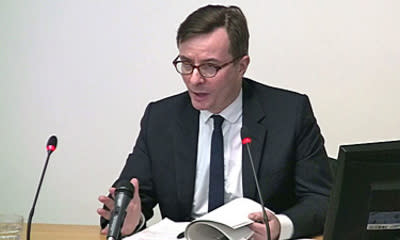Sky News: Tighter Controls After Email Hacking

The head of Sky News has told the inquiry into media ethics that managers at the channel had twice authorised the illegal interception of emails - but said it was "highly unlikely" anything similar would be sanctioned in future.
John Ryley said the go-ahead to allow email interception was taken only after detailed consideration and because management believed the stories were in the public interest.
The Leveson Inquiry heard that one of the stories related to 61-year-old John Darwin, who faked his own death in a canoeing accident in 2002.
His wife Anne then claimed hundreds of thousands of pounds from insurance policies and pension schemes.
The email evidence obtained by North of England correspondent Gerard Tubb was handed to police and used in the successful prosecution of Mrs Darwin for insurance and pension fraud.
The Darwins, from Seaton Carew, near Hartlepool, were jailed at Teesside Crown Court in 2008 for the swindle, which deceived the police, a coroner, financial institutions and even their sons, Mark and Anthony.
John Ryley said his correspondent had accessed the account in June 2008 while working on a "court backgrounder" to go out at the conclusion of the trial.
"John Darwin had been using emails to go about his business in the five years that he had disappeared," he said.
"Sources close to the prosecution made clear that they were not going to be following up on the emails."
Ten days after accessing the account, the findings were reported to the police. The detail was "pivotal" in the case against the fraudsters, the inquiry heard.
However, the witness said the likelihood of Sky management sanctioning a similar exercise in future was very unlikely.
Mr Ryley said there had been a re-focus at Sky on rolling news and on-the-day stories rather than longer form investigations.
"Journalism is at times a tough business," he said.
"And we need at times to shed light into wrongdoing. There may be an occasion. It would be very, very rare."
He added: "Sky News journalists will in future have a mandatory requirement to seek legal advice before taking any actions which might be viewed as unlawful."
The issue of how far legitimate investigative journalism can go in pursuing potential criminality and other stories in the public interest is being considered by Lord Justice Leveson.
Although there is no public interest immunity from prosecution for any journalist breaking the law, the inquiry has heard from numerous newspapers and news organisations that rules are sometimes broken in the pursuit of a story.
John Ryley also apologised at the hearing for "inadvertently misleading" the inquiry over the illegal interception of emails.
In a letter to Justice Leveson in September 2011, Sky News stated that an internal investigation had revealed no instances of hacking in the past.
The witness said that was because an internal review had concentrated on phone hacking and the paying of public officials - both of which it found no evidence of at the broadcaster - and did not look at the accessing of emails.
Mr Ryley said the error in the statement was "very regrettable indeed and I apologise", and this was accepted by Lord Justice Leveson.
In a statement, Ofcom said it would be "investigating the fairness and privacy issues raised by Sky News' statement that it had accessed without prior authorisation private email accounts during the course of its news investigations".
The regulator added: "We will make the outcome known in due course."
Also appearing at the inquiry were Aidan Barclay, chairman of Telegraph Media Group, which publishes the Daily Telegraph and Sunday Telegraph, and Evgeny Lebedev, chairman of the companies that own the Independent and London's Evening Standard.
Mr Lebedev said he did not see any problem with politicians and media proprietors having contact.
"I think it's just unfeasible to erect Chinese walls between proprietors or between editors and politicians, because we occupy the same sphere of existence.
"But I think where problems begin is when proprietors - because of power of their media organisations - start exerting influence over politicians and trying to affect countries' policy. That's where I think problems begin."
And in a written witness statement, Mr Barclay warned against a "backlash" following allegations of phone-hacking and payments to public officials.
"One of the biggest dangers that the press faces - in a backlash against the actions of a small minority of journalists - is that it becomes over-regulated," he said.
"Newspapers and their websites already operate under a burdensome body of law and indeed are competing with other media organisations in the digital arena that do not seem to be subject to UK domestic law."
Rupert Murdoch will speak at the inquiry into media standards later this week.

 Yahoo News
Yahoo News 